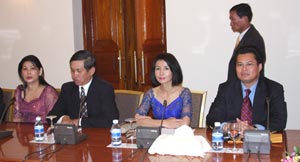Sok An Appearance at Cambodian New Year Parade
Mayor Bob Foster
333 W. Ocean Blvd 14th Floor
Long Beach, CA 90802
Dear Mayor Foster:
We are writing to protest the appearance of Cambodian Deputy Prime Minister Sok An at this year's annual Long Beach Cambodian New Year Parade, to be scheduled in April.
For over a decade, Cambodia has been under the administration of Prime Minister Hun Sen, a government that has violated an incalculable multitude of human rights with impunity since 1997, so much so that they have simply ceased to meet with the latest United Nations rights envoy this past December. Cambodia has one of the most corrupt governments in the world today, ranked 162nd out of 180 nations according to Transparency International (180 being most corrupt). Mr. Sok An is the head of the Cambodian Council of Ministers and is that government's second in command.
We the undersigned, Cambodians and non-Cambodians alike, are deeply shocked and saddened that the right hand man of such a government has been invited to parade himself in an event purported to celebrate diversity, community, and personal freedom. How does one celebrate these values by welcoming the very figure that is a perpetrator against them? What community and freedom are our brothers and sisters celebrating in Cambodia, where Mr. Sok An and colleagues rule the people with forced evictions and rampant land grabs, where simple freedom of expression is met with incarceration and death?
In their press release on January 9, 2008, the committee that invited Mr. Sok An stated that they "believe in open dialogs and making changes through peaceful means as taught by Dr. Martin Luther King." That may be well and good but a parade is simply not an appropriate venue for having such dialog. While Dr. Martin Luther King met with opposition figures to create open dialog and further understanding, we cannot imagine he would have invited members of the Ku Klux Klan to participate in a parade celebrating the African-American community as a means of opening this dialog.
We implore your understanding and compassion in this matter and fervently hope you will rescind Mr. Sok An's unfortunate invitation.
Sincerely,
The Undersigned
Download Petition in PDF Form
http://www.myp1t.com/design/pic/SokAnPetition.pdf
Please sign and mail petition to:
myP1T.com
PO Box 4129
Long Beach, CA 90804
or email a scanned copy with signature(s) to:
petition@myp1t.com
http://www.petitiononline.com/newyear/petition.html
» Read more!














